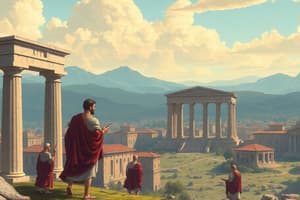Podcast
Questions and Answers
What period does 1000-612 BCE refer to?
What period does 1000-612 BCE refer to?
- Augustean rule
- New Assyrian Empire's conquests of fertile (correct)
- Golden age of Athenian philosophy
- Establishment of the Roman Republic
What significant event occurred in 753 BCE?
What significant event occurred in 753 BCE?
The mythical foundation of Rome by Romulus and Remus
What happened in 509 BCE?
What happened in 509 BCE?
Establishment of the Roman Republic
Who rebuilt the city of Babylon between 605-562 BCE?
Who rebuilt the city of Babylon between 605-562 BCE?
What is the significance of the period 476-431 BCE?
What is the significance of the period 476-431 BCE?
What did Alexander the Great achieve between 336-323 BCE?
What did Alexander the Great achieve between 336-323 BCE?
What era does 320-180 BCE represent?
What era does 320-180 BCE represent?
What was founded in 221 BCE?
What was founded in 221 BCE?
What period did Augustus rule as the first Roman Emperor?
What period did Augustus rule as the first Roman Emperor?
What approximate date is given for the birth of Jesus of Nazareth?
What approximate date is given for the birth of Jesus of Nazareth?
What happened in 70 CE?
What happened in 70 CE?
What significant action did Emperor Constantine I undertake in 312 CE?
What significant action did Emperor Constantine I undertake in 312 CE?
What does the period 400-550 CE represent?
What does the period 400-550 CE represent?
What marked the collapse of the Western Roman Empire in 476 CE?
What marked the collapse of the Western Roman Empire in 476 CE?
Flashcards are hidden until you start studying
Study Notes
Timeline of the Classical Period
-
1000-612 BCE: New Assyrian Empire expanded through conquests of fertile regions, establishing dominance in the Near East.
-
753 BCE: Mythical foundation of Rome by Romulus and Remus marks the beginning of Roman civilization and mythology.
-
509 BCE: The Roman Republic is established, transitioning from monarchy to a system governed by elected representatives.
-
605-562 BCE: King Nebuchadnezzar II significantly rebuilds the city of Babylon, enhancing its grandeur and cultural significance.
-
476-431 BCE: This era represents the Golden Age of Athenian culture characterized by advancements in philosophy, the development of democracy, and economic prosperity.
-
336-323 BCE: Alexander the Great's conquests across the eastern Mediterranean and Persia encourage the dissemination of Greek culture, initiating the Hellenistic era.
-
320-180 BCE: The Mauryan Empire flourishes in India, contributing to the rise of Buddhism as a major religious influence in South Asia.
-
221 BCE: The Chinese Empire is unified under Qin Shi Huangdi; the Han Dynasty later follows, lasting from 210 BCE to 220 CE, solidifying imperial rule.
-
27 BCE - 14 CE: Augustus serves as the first Roman Emperor, initiating the transformation of the Roman Republic into the Roman Empire.
-
6 or 4 BCE: Estimated birth year of Jesus of Nazareth, marking the beginning of a significant religious figure in Christianity.
-
70 CE: Roman forces successfully suppress a Jewish rebellion in Palestine, leading to the expulsion of Jews from Jerusalem, impacting Jewish history profoundly.
-
312 CE: Roman Emperor Constantine I embraces Christianity, influencing the future religious landscape of the Roman Empire.
-
400-550 CE: The Gupta Empire rises in India, noted for its cultural and artistic achievements, while Hinduism becomes increasingly prominent.
-
476 CE: The Western Roman Empire collapses, giving way to Germanic kingdoms, while the Byzantine Empire endures in the eastern Mediterranean until 1453 CE.
Studying That Suits You
Use AI to generate personalized quizzes and flashcards to suit your learning preferences.




